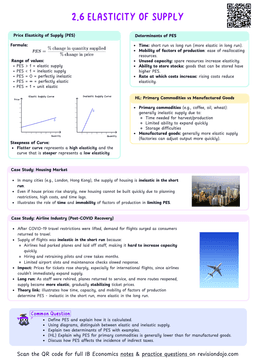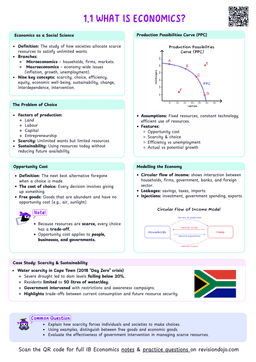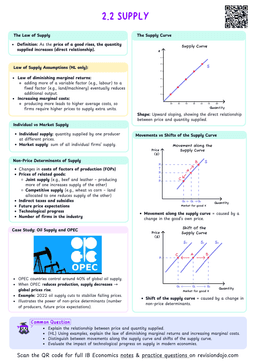Government intervention
When a government alters the resource allocation that markets would have achieved working freely on their own.
Governments may intervene to influence the market outcomes to:
- Earn government revenue.
- Support firms.
- Support households on low income.
- Influence level of production.
- Influence level of consumption.
- Correct market failure.
- Promote equity.
Earning Government Revenue
Governments need finances in order to finance public goods and services. Therefore, governments intervene in the markets to gain this revenue through:
- Indirect taxes
- Direct taxes.
Indirect taxes
Indirect taxes
Taxes levied on spending on goods and services. They are called indirect because while consumers contribute to part or all of the tax, it is the suppliers (firms) who collect and transfer these taxes to the government authorities (consumers pay the taxes indirectly).
The two types of indirect taxes are:
- Value Added Tax(VAT)
- Excise Tax
Governments may impose excise taxes on demerit goods such as cigarettes or alcohol, to discourage their use within the society.
Direct Taxes
Direct tax
Tax paid to the government directly by the taxpayer (individual).
Types of direct taxes include: Income tax, Property tax, and Wealth tax.
- Apart from collecting government revenue, direct taxes also promote equity by ensuring that people with higher incomes pay higher taxes (progressive taxation).
- Therefore, direct taxes are used by governments not only for funding public spending, but also to achieve income and wealth redistribution.
Supporting Firms
Governments frequently intervene in markets to support firms. They may do so to:
- Help small firms with financial assistance in order to increase their ability to compete.
- Encourage the growth of desirable industries e.g sustainable energy production.
- Protect domestic producers from more efficient foreign producers.
- Governments can help firms through the following:
- Subsidies for raw materials or required materials, to reduce costs of production
- Direct Provision of goods
- Trade protectionism policies such as quota and tariff to protect domestic firms (discussed in Global Trade)
Supporting Households on Low Incomes
In free markets, not all households earn the same income, and its very often the case where many households earn income below an adequate level to:
- Meet their basic needs (water, food, shelter...).
- Satisfy their wants.
As a result, governments may intervene in free markets to support households on low incomes.
Example- Minimum Wages
- Unemployment Benefits
- Progressive tax systems
- Subsidies for necessity goods
- Ration shops
- Direct provision of necessity services such as:
- Healthcare
- Education
- Setting maximum prices for necessity goods (Price floors) such as:
- Food
- Housing/Accommodation
Influencing the Level of Production
Governments often aim to adjust production levels in specific industries to align with societal goals.
Example- If a government observes a successful future for the country's textile production, it may support the textile production in the country through:
- Subsidies
- Trade protection
- Price controls
Influencing the Level of Consumption
With one of the microeconomic objectives being consumer welfare, governments often intervene in free markets to promote a certain pattern of consumption that:
- Resolves public health challenges.
- Reduces the harm to the environment.
- Promotes social welfare.
- Governments may want to promote the consumption of merit goods such as education, hence it might consider to:
- Subsidise those sectors or field of work
- Directly provide those goods and services
- Utilise nudge theory
Correcting Market Failure
Market Failure
Occurs when firms fail to efficiently allocate the resources within an economy.
Allocative inefficiency occurs when market failure is present as the market does not produce a socially desirable quantity of goods. This may occur due to:
- The market producing goods/services at quantities above socially optimal level (overallocation of resources).
- The market producing goods/services at quantities below socially optimal level. (underallocation of resources)
Hence, in order to achieve allocative efficiency, the government has to intervene to influence the resource allocation and fix the market failure.
Example- One type of market failure is pollution, where factories pollute the environment during production, without paying the pollution abatement costs and hence negatively impacting the society at a greater effect than themselves.
- Another type is education, where the governments fail to provide free or subsidised and accessible education to everyone, and the society is undereducated.
Promoting Equity
Equity
Refers to the concept where there is a fair resource distribution.
- Free markets fail most of the time to achieve fair and equal resource distribution, which leads to unequal wealth distribution for many households.
- Therefore, governments intervene to redistribute these resources in a fair manner.
Promoting equity includes:
- Setting minimum wages to ensure fair payment for workers.
- Setting minimum prices to ensure fair payment for producers.
- Setting maximum prices for accommodation/housing to make shelter affordable for all income levels.
Equity and equality are not the same concept. While they refer to similar ideas, they are different and should be used carefully.



